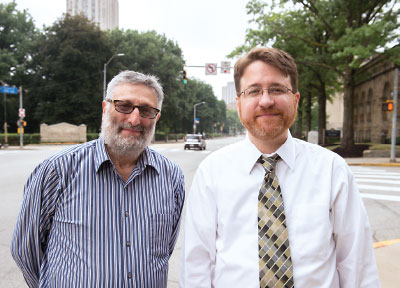Sometimes employing evidence-based practice in real-world settings can be like a game of telephone: the message gradually changes as it travels from person to person until it is so distorted that it no longer resembles its former self. Or sometimes the message just takes too long to reach its intended recipient.
The idea behind the Center for Interventions to Enhance Community Health (CiTECH), developed by the University of Pittsburgh’s School of Social Work in partnership with the Department of Psychiatry, is quick delivery and preservation of the original message—in this case the evidence-based intervention—so that it is effectively administered to those who need it in the community.
“We view having community leaders as partners not only in intervention dissemination, but also in intervention development, as a key component to generating practices that can be feasible, effective, and sustained in the underresourced and time-pressured environments facing today’s community programs,” CiTECH Director Shaun Eack, Ph.D., told Psychiatric News. “By bringing these worlds together, we will make research advances more relevant and hope to hasten the translation of evidence to community practice,” he said. Eack is also a professor of social work, psychiatry, psychology, and clinical and translational science at the University of Pittsburgh.
The university’s Office of the Provost established the center with $1.2 million, and projects stemming from the center are funded by a variety of sources. CiTECH launched in August.
The community has just begun to reap the benefits of CiTECH, Eack explained. For more than a decade, Eack and his colleagues at the University of Pittsburgh have worked to establish the evidence base for cognitive enhancement therapy (CET) for people living with schizophrenia, noting that CET is one of the only federally recognized cognitive rehabilitation treatments for this population. He observed, however, that “training clinicians is one of the most serious bottlenecks to dissemination of the treatment since they are busy and underresourced. Also, they do not have time for a lot of in-person training, which is slow, costly, and fades very quickly after the initial workshops or seminars.”
To address this issue and support the implementation of CET in the community, Eack and his team have partnered with a provider network and a Medicaid managed care organization to develop an online training and technical assistance portal for psychiatric rehabilitation professionals.
“With input from frontline providers, consumers, and the scientists who developed CET, the portal aims to dramatically reduce training time and costs required to implement CET, thus enhancing its capacity to be available to the many people who could benefit from it,” Eack said.
The training portal will consist of educational content to be used with the traditional CET treatment manual, he noted, and will give clinicians an on-demand, easily accessible, and low-cost way to learn the approach. It will consist of 15-minute video segments and learning modules to deliver the treatment with fidelity to the evidence-based model and will be available via laptops, tablets, smartphones, and desktop computers, according to Eack.
“As we develop the training portal, we are also learning what adaptations to CET are necessary to ensure feasible implementation within community psychiatric rehabilitation programs and are working with managed care organizations to ensure that implementation is financially supported and sustainable,” he added.
Suicidal adolescents in primary care settings are also getting much-needed help from a CiTECH investigator-led intervention. The $6.1 million National Institute of Mental Health–funded Enhancing Treatment Utilization of Depression and Emergent Suicidality (ETUDES) project, headed by David Brent, M.D., who is also CiTECH co-director, aims to develop tools for primary care clinicians to assess, triage, and manage youth who are depressed or experiencing suicidality. Brent is the Endowed Chair in Suicide Studies and a professor of psychiatry, pediatrics, epidemiology, and clinical and translational science at the University of Pittsburgh.
ETUDES will enable clinicians to determine the best disposition for their adolescent patients who screen positive for depression, encourage patients and parents to participate in treatment, and use technology to guide clinicians in the development of a personalized safety plan via a smartphone app.
“ETUDES is an example of an investigator-initiated study that will benefit from the synergy provided by CiTECH and this unique collaboration between psychiatry and social work,” Brent said. ■

